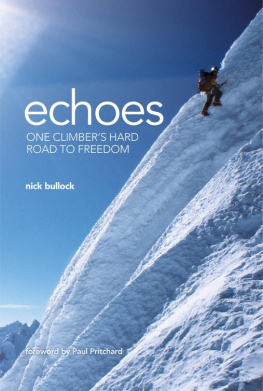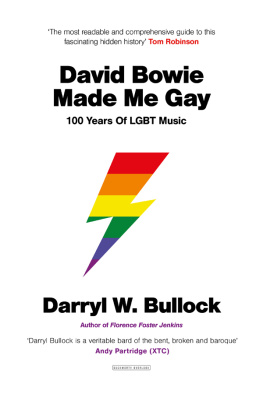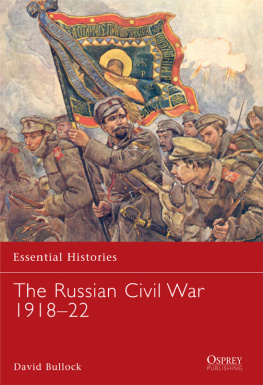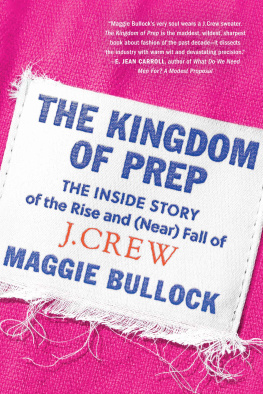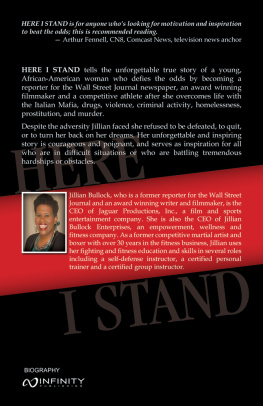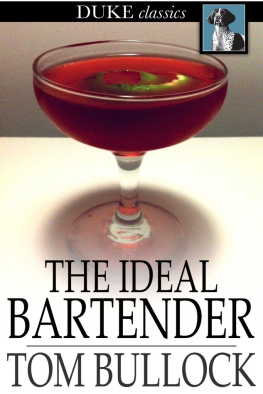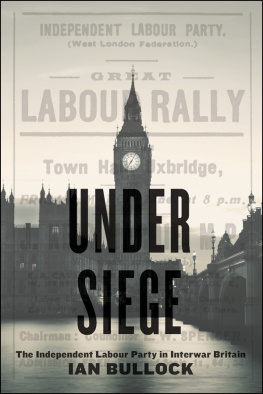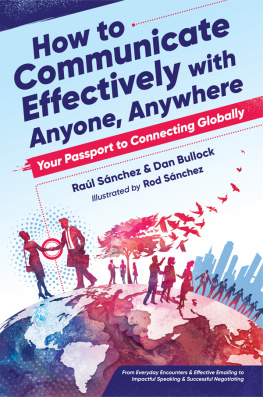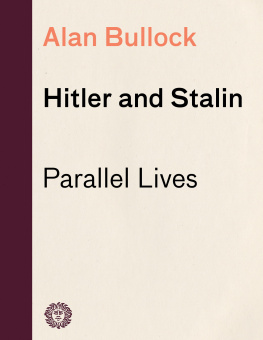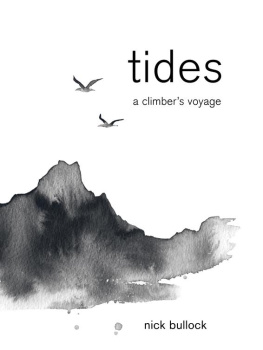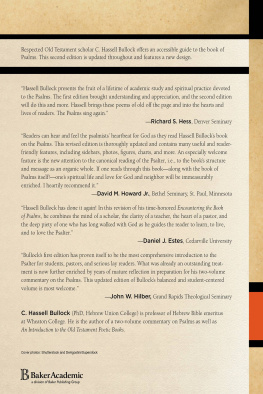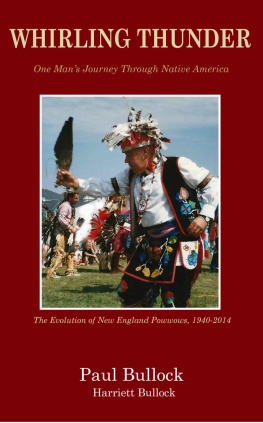Nick Bullock is a fucking nutter, or at least one could be excused for thinking him so. After all, heres a man who relishes the moniker of Psycho. A self-proclaimed madman who has fallen off and survived just about every dangerous route around. I mean, falling onto The Bells peg! That is complete and utter insanity.
However, to aspire to being more than just another good climber you must have your head in the clouds and push the boundaries of your physical ability ceaselessly. And if youre going to do this then there comes with it a price falls, obsession, relationship failures and, to a point, madness. And this is what these pages contain an honest account of what it means to be an Alpinist.
After all, Bullock does join a long and distinguished line of glorious nutters across generations of British climbers Crowley, Menlove, Whillans, Phillips, Dirty Alex, Dirty Derek, Johnny Dawes, Stevie Haston. All these climbers, Im sure you will agree, are/were no mere slouches, just a few RPs short of a full rack. Besides, we need characters in climbing, as it was in danger of losing them all in the sport climbing purges of the 1990s.
Having completely removed myself from the climbing scene since 1998, I had only vaguely heard of Nick Bullock. Back in 1997 he had attempted the Meru Sharks Fin in the Garwhal Himalaya a few years after myself, Johnny Dawes and Philip Lloyd made our attempt on this wondrous and only recently climbed mountain feature, but I never met him.
Then recently I was flicking through an Italian magazine in which he detailed his approach to writing about climbing. Even if there was no hope of getting published he would still write because he loved the added challenge of writing, of translating the intensity of the ascent into text. Here was a climber who I could equate with and I was intrigued to meet him. And meet him I did, very soon after arriving in Llanberis. We had a lot in common even though we had never met. We had climbed the same climbs, rocked over onto the same holds, clipped the same manky pegs and traversed the globe to many of the same boulder-strewn glaciers. That was as good a place to start from as I could wish for.
I had begun leading again after an eleven year hiatus due to injury, and had moved back to Llanberis for a while to hone my new one armed climbing technique. Nick was living in his van in the car park at Ynys Ettws and climbing every day. This prompted Adam Wainwright to mention with a giggle that we could be the only two full-time climbers in Llanberis. In the 1980s there would have been forty full-timers in the village.
Bullock is an amateur I mean in the Olympian sense of the word as we were all amateurs in Llanberis in the 1980s. He is a deep gasp of fresh air in this age of professionalism, this age of film deals and corporate sponsorship. Like an ascetic he simply goes climbing.
In Echoes Bullock is seeking his own voice. Under his guidance we are taken on a roller-coaster ride as Nick the all-round climber becomes Nick the all-round writer. His very irregularity of thought one page he says grades dont matter when on the next page he is keen to onsight an E7 is what makes this book so joyous to read. Those who dont change their mind regularly are at risk of being dishonest with themselves. There is no such risk in Bullocks writing.
However, it is the self questioning (sometimes self attacking) that makes this a rare climbing book indeed. Through his bold and adventurous climbs often undertaken alone he finds he has come to answer some important existential problems.
In fact, throughout Echoes, with its seemingly unthinking frenzy of ascents, Bullock comes to the realisation that he has answered some pretty tough questions.
Paul Pritchard
Tasmania
I cradled the mans head in my hands. His hair was wet. Blood seeped between my fingers. Strings of cerebral fluid hung from his ears and nose. Grey sticky stuff dripped from my knuckles. Sprawled on the floor, the inmate writhed. He was short and stocky, a real powerhouse. I grabbed a blue prison vest, bundled it up, pushed the fabric into the hole in his skull. He was flapping like a fish.
Then, miraculously, the prisoner stood. Some kind of animal drive, some instinct for survival, forced him upright. He spoke, suddenly, in a strange bored monotone.
Oh, oh, they tried to kill methey tried to kill meIm dying.
He staggered forward, moaning unintelligibly, bumping into the weight-training equipment. It rattled. I held onto him, guiding him around stands, bars, and circular weights stacked in pyramids. Everything was streaked with blood and snot and the grey fluid leaking from his head. He made a sound from the back of his throat, part growl, part cry.
We both slipped, leaving bright red skid-marks on the floor. For the second time he collapsed. Then he spoke again, very slowly.
Theyve killed me.
I saw myself tangled up in cerebral string, red oxygenated froth soaking into my tracksuit trousers. I inhaled the smell of sweat and the metallic tang of blood. Then I slithered to my feet, screaming for help. The noise bounced back at me off the gymnasium walls. Thirty inmates stood quietly, like an expectant crowd at an execution. No one helped. No one except for John, an inmate entrusted with the job of gym orderly. He calmly picked up a short, blood-soaked iron bar, carefully wiped it clean, and put it back in its place on the rack.
I was too shocked and horrified to understand what had just happened. But I found out soon enough. A contract had been taken out on the inmate. The price for the hit was twenty quids worth of crack cocaine paid by a dealer, who had often trained with the victim until he found out he was a paedophile. The dealer had needed to save face.
The injured inmate was twice bludgeoned across the back of his head with the short iron bar, ordinarily used for bicep curls. The would-be killer held it in both hands like an axe and swung from behind the inmates back as he leant forward to pick up his own weight bar. But the victim didnt go down on the first swing. The attacker a crack-addicted coward panicked. He lifted the bar above his head and swung again with even more force. This time the victims skull popped and he crashed to the floor. The second swing had punctured his skull and saved his life by releasing the pressure from the first blow.
The police arrived almost immediately and began an inquiry. A clot dried on the gymnasium floor, large and jagged, like the outline of Australia, while I stood speaking to them. Two days later the police concluded I was innocent of taking a bribe to turn a blind eye. It was ironic that Id been accused of looking the other way. From our team of six physical education officers, I had been the one who most regularly complained to management about sloppy procedures causing us to leave inmates unattended. Maybe thats why the would-be killer chose to murder when I was on duty. It was retribution for my not trusting them.
The prison governors had been told this inmate was at risk, but they had ignored the warnings and so attempted to place the blame on me. The original paperwork proving my innocence had gone missing, but fortunately a photocopy was found, and the internal blame-shifting inquiry collapsed. I escaped prosecution either by a stroke of luck, or perhaps because of a methodical police investigation. I will never know.
I was thirty two and I had worked at Gartree Prison for ten years. I had spent eleven years in total working for the prison service at the time of this attempted murder, four and a half as a basic grade prison officer, and six and a half as a PE instructor. Over the course of my career, my opinions, my outlook, even my personality were transformed. At twenty one I had walked into a prison for the first time. I was impressionable, scared, desperate to be accepted and living constantly with doubt and uncertainty. At thirty two I was confident, prepared to give everyone a chance, be they paedophiles, murderers, rapists, gangsters, terrorists, drug dealers or fellow prison officers. It didnt matter to me the colour of a mans skin or his religion or from which country he originated. All I was concerned about was how people behaved and interacted with each other from day to day. Deep down I think I had always been like this, but in my early years of prison service it had been easier to fall in line.

